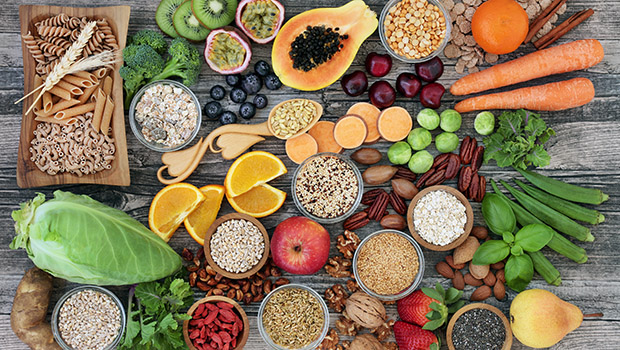Folate in spinach can boost those mood-controlling neurotransmitters in your brain. Yet if Popeye’s fix doesn’t appeal to you, try eating an orange or grapefruit to get the same mood-regulating vitamin B benefits. For a moment of calm, eat a banana for its potassium and serotonin.
Grumpy? Shift that mood with some berries. Eating the rainbow is sage advice for a happier you, and no, we don’t mean that bowl of sugary Froot Loops. Healthy, colorful fruits and veggies can make for a healthier brain and a happier you. We rounded up 10 books to help you rock your good mood—with food.
Flat Belly 365: The Gut-Friendly Superfood Plan to Shed Pounds, Fight Inflammation, and Feel Great All Year Long by Manuel Villacorta
If you’ve ever consumed too many doughnuts in one sitting, you know sugar can make you feel sluggish and tired. Superfoods do the opposite, helping you feel super! Flat Belly 365 offers enticing recipes even if your goal isn’t to have washboard abs. National dietitian Manuel Villacorta shares recipes made with superfoods, anti-inflammatory fats, and prebiotic and probiotic foods to balance your appetite, reduce cravings, regulate blood sugar, fight inflammation and fuel your body for optimal health. Each chapter is organized by the seasons of the year, making shopping and meal planning easy. Seven-day menu plans are included.
Eat, Drink, and Be Healthy: The Harvard Medical School Guide to Healthy Eating by Walter Willett, MD and P.J. Skerrett
If you want to eat healthy but your head spins from all the food trends, conflicting information and celebrity diets, Eat, Drink, and Be Healthy cuts through all the noise. Walter Willett, MD, chair of the Department of Nutrition at the Harvard T.H. Chan School of Public Health and Professor of Medicine at Harvard Medical School, draws on cutting-edge research to explain what the USDA guidelines have gotten wrong—and how you can eat right. Learn simple principles and meal plans to live better and longer. Discover the research behind the best types of carbohydrates, fats, and proteins, and the importance of supplements. After not smoking, controlling your weight is the single most important factor for a long, healthy life, the authors contend.
The Simple Guide to Natural Health: From Apple Cider Vinegar Tonics to Coconut Oil Body Balm, 150+ Home Remedies for Health and Healing by Melanie St. Ours
Use medicinal plants, healing foods and everyday ingredients like coconut oil and apple cider vinegar to help you heal from ailments and thrive. Clinical herbalist Melanie St. Ours offers recipes that promote emotional balance and health. Try her mood-lifting trail mix, happiness syrup or pick-me-up peppermint latte. Make a cup of lavender or chamomile tea to relieve anxiety or depression. The food in your pantry and fridge can support your health and improve your outlook.
Rise and Shine: Better Breakfasts for Busy Mornings by Katie Sullivan Morford
How you start your day matters. You already know breakfast is the most important meal of the day, but what if you could make breakfast so appealing it brings your family together around the table each day? Nutritionist and mother of three Katie Sullivan Morford offers tips, recipes and inspiration for making delicious and nutritious breakfasts.Rise and Shineis for parents who don’t want to sacrifice quality time and quality meals on busy mornings.
The Happiness Diet: A Nutritional Prescription for a Sharp Brain, Balanced Mood, and Lean, Energized Body by Drew Ramsey, MD and Tyler G. Graham
What if the foods responsible for the obesity epidemic are also causing increased levels of depression and anxiety? That’s the premise behind The Happiness Diet. If you want simple solutions to make and eat feel-good foods for your brain and your body, this is the book for you. Learn how to move away from the modern American diet (which the authors call MAD) and get nutrition back in your meals.
The Mood Cure: The 4-Step Program to Take Charge of Your Emotions—Today by Julia Ross
Julia Ross’s plan provides a natural cure for your mood based on deficiencies in our neurotransmitters. She believes we can use food to overcome depression, anxiety, irritability, stress and other negative emotional states that take a toll on the quality of our lives. Julia’s plan is based on the use of four mood-building amino acids and nutritional supplements. Enjoy meals that include protein, healthy fat and certain key vegetables. Take her mood-type questionnaire to start feeling better and brighter.
Brain Food: The Surprising Science of Eating for Cognitive Power by Lisa Mosconi, Ph.D.
Lisa Mosconi is a neuroscientist and a certified integrative nutritionist who focuses on the dietary needs of the brain. Lisa provides recommendations for a complete food plan while calling out some popular notions, including: why a paleo diet may not be ideal, why avoiding gluten may be a mistake, and how getting enough water improves alertness.Review lists of what to eat and what to avoid and take a quiz that will tell you where you are on the brain health spectrum. Use your food choices to improve memory, prevent cognitive decline, eliminate brain fog, lift depression or improve mental alertness.
At Home in the Whole Food Kitchen: Celebrating the Art of Eating Well by Amy Chaplin and Johnny Miller
When your food, kitchen and meals are bright, you will be, too. Delight in the joy of food again in this colorful book full of recipes, menus and whole food tips. “Cook simple meals with organic ingredients. Find a daily practice that helps keep you connected, inspired and grounded. Practice gratitude and do what you love,” writes chef, food stylist and lover of food, Amy Chaplin. Vegans, vegetarians and carnivores will all find recipes to add to their collection and ideas to inspire a beautiful kitchen.
The Whole30: The 30-Day Guide to Total Health and Food Freedom by Dallas and Melissa Hartwig
The popular The Whole30offers a 30-day meal plan designed to reset your health, habits and relationship with food so you can overcome cravings and addictions. The science behindWhole30is covered in the authors’ first book,It Starts With Food.The plan focuses on the quality of real food and omits processed foods and sugar as well as grains and legumes. You will have to say goodbye to cheese and even hummus (made from legumes), but you can keep your morning coffee if you drink it black or with almond milk. Eat foods for a healthy psychological response, transform your relationship with food, quash cravings and boost your immune system.
Keto Comfort Foods: Family Favorite Recipes Made Low-Carb and Healthy by Maria Emmerich
Comfort foods…just hearing those two words can make you feel good. We all crave them and they are designed to give us a big helping of comfort and foster well-being. The problem is, most comfort foods aren’t really good for your body—until now. In Keto Comfort Foods, enjoy a healthy spin on some of your favorite comfort foods with a variety of recipes presented with beautiful photography. Each recipe contains nutritional information and rated low, medium or high ketogenic (putting the body into a state of ketosis to burn stored fat). Whip up some beef stew, BBQ chicken lasagna, clam chowder, maple bacon ice cream or Sunday pot roast.
Read More









